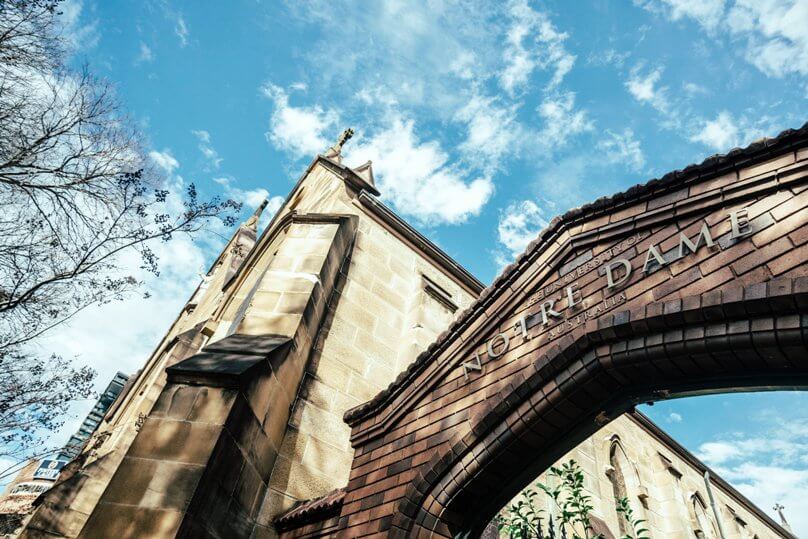
Scholars from across Australia were welcomed to the University of Notre Dame’s Sydney campus for its March conference on Mariology, the theological study of Notre Dame, Mary.
This event proved to be an enjoyable occasion for all participants, as well as being an inspiration for further research into the discipline of Mariology. It is a truism to say that Mariology has not had a prominent place in post-conciliar Catholic theology.
While popular forms of Marian piety are still present in many parishes and numerous new communities – lay and religious – actively promote Marian devotion, there exists, nevertheless, a dearth of serious scholarly research on Mary and Her place in the Church. This lacuna was precisely the impetus behind this conference.
The convenors of the conference were drawn from three key Catholic institutions: the University of Notre Dame (Sr Moira Debono RSM and myself); the Catholic Institute of Sydney (Dr Isabell Naumann ISSM and Dr Peter McGregor); and Campion College (Dr Paul Morrissey).
Their hope for the conference was that it might be an opportunity for academics of a variety of disciplines to put their expertise to the service of Mariology.
This hope was more than fulfilled when the Call for Papers – released in late August 2015 – was met with an impressive response from academics from around Australia.
In particular, there was a very encouraging number of post-graduate students and early-career academics who sought to present on Mary. This, we may dare to claim, is a positive sign that Mary is making a comeback in institutes of higher learning! Headlining the program of 32 papers were five keynote papers.
The conference began with Conference Co-convenor Dr Naumann giving the opening address, which sought to situate Mariology at the beginning of the third Millennium.
Later that day, the afternoon session began with Dr Tracey Rowland (John Paul II Institute for Marriage and Family, Melbourne) speaking on The Queenship of Our Lady in the Catholic Social Imagination, and Rev Fr Scot Anthony Armstrong (member of the Brisbane Oratory) offering a studied proposal of an innovative development in our appreciation of the Feast of the Annunciation in his presentation, The Annunciation: Icon of All Genuine Ecclesial Reform.
The second day of the conference began with visiting Notre Dame Professor John Haldane discussing Marian Transformations: Art, Philosophy and Mystical Theology. Rev Dr Robin Koning SJ (Australian Province of the Society of Jesus) provided the final keynote address, drawing out key Mariological aspects of St Ignatius of Loyola’s spirituality in his paper, Revisiting the Marian Dimension of Ignatian Spirituality.
Among the many other papers were three by Orthodox theologians. Protopresbyter Dr Doru Costache (St Andrew’s Greek Orthodox Theological College) enlightened a mostly Catholic audience on The Mystery of Mary in the Byzantine Theotokia of Dominical Vespers. Dr Mario Baghos, also from St Andrew’s, took a different approach investigating the role of the Theotokos (Mother of God) as protectress of and intercessor for the city in his presentation, Theotokoupoleis: the Mother of God as Protectress of the Two Romes.
Finally, Dr Bernard Doherty, who teaches at St Mark’s National Theological Centre, Canberra, addressed The Post-Roman Catholic Careers of Two Australian Marian Visionaries. Possibly the most impressive aspect of the conference, for both the organisers and participants, was the spirit of collegiality which was clear and evident throughout proceedings.
For instance, it was impressive to see that scholars from diverse disciplines, institutes, and congregations were able to enter into dialogue that was both spirited and respectful.
This was seen, not only during presentations, but also during the less formal moments of the days. It was great to see that both the tea breaks and the conference dinner were loud affairs punctuated by laughter, serious discourse, and good food! Beyond the collegiality and good will which was fostered during the conference, other fruits have come from this work. In the first place, a number of articles (based on the papers given) are being compiled into a book, Mariology at the beginning of the Third Millennium, which will be published under Wipf & Stock’s Pickwick imprint.
This book will be the first in a series entitled Theology at the Beginning of the Third Millennium. A second fruit, which is related to the first, is that UNDA-Sydney will host a follow-up conference on another area of theology in February 2018.
While the final topic of this conference is not yet decided, it will fall under the banner of Theology at the Beginning of the Third Millennium. In sum, there is much work to do in Catholic theology at the beginning of this third millennium.
It is hoped that this conference and book series can play a part, however small, in contributing to the discourse we must continue to have in order to raise the human spirit to the divine.
